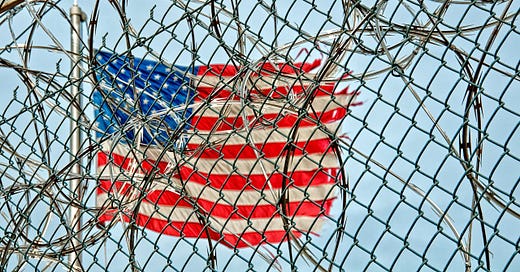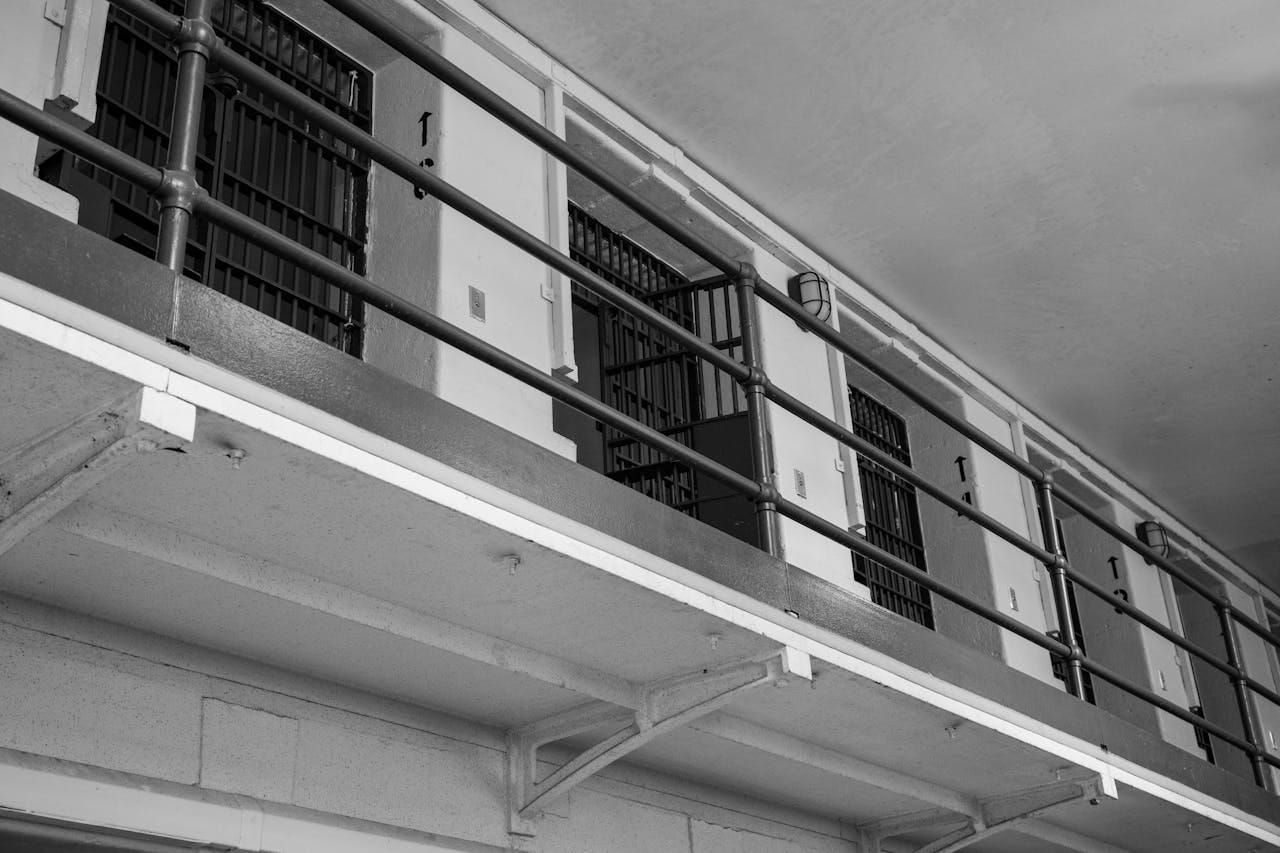Criminalization at the Core of Authoritarianism, Fascism, and Resistance
Guest contributor: Andrea J. Ritchie
For us at Interrupting Criminalization, criminalization extends far beyond the enactment and enforcement of criminal laws and policies to include all practices of policing and punishment by the state, institutions, and individuals.
Criminalization is a political process that creates groups of inherently criminalized “others” for whom rights do not exist in reality, because they are framed as existential threats to society who must therefore be violently controlled, punished, and removed.
Criminalization manifests not only through criminal laws and policies, but also in the content and enforcement of civil and administrative laws, regulations, and procedures, including immigration, family, public benefits, education, employment, and other policies. And, laws, policies, and police are just the tip of the iceberg – virtually every institution of society engages in and enforces criminalization, from to schools and universities, to health care and social services, to libraries and other community institutions.
And, and all of us participate in criminalization to some degree. Beyond law and policy, criminalization is shaped and undergirded by individual and collective impulses to scapegoat and punish, fueled by criminalizing narratives and practices that are central to the operation of ideologies of white Christian supremacy, cisheteropatriarchy, and imperialism - all of which fuel authoritarianism and fascism.
Criminalization under any political regime is a process that normalizes and legitimizes a certain level of violence, denial of care, and deprivation of necessities for survival for targeted groups - whether that is the violence of family separation at the border or prison wall, solitary confinement in prisons or psychiatric wards, police violence, the violence of denying health care to migrants, pregnant people, disabled people, or trans people, or the violence of denying access to information, community, and spaces of learning.
Criminalization prepares the way and creates the infrastructure for exponential expansion and escalation of all of these forms of violence under authoritarianism and fascism, as we are currently seeing on so many fronts. As Rachel Herzing and her coauthors explain in Prison Abolition and Fascism, fascism requires the machinery and legitimacy of the prison industrial complex to function.
But it’s important to recognize that the connection between criminalization, authoritarianism, and fascism is not limited to the use and expansion of the prison-industrial complex to repress dissent, target adversaries, and disappear communities.
Criminalization is literally at the core of how fascism and authoritarianism operate: it creates and expands categories of “enemies within” who threaten an existing, desired, or imagined racist, sexist, ableist, transphobic, homophobic, imperialist, capitalist social order, and who therefore must be contained, caged, and ultimately eliminated and eradicated. In other words, criminalization is the process of creating an “us” and “them” described by Scot Nakagawa, of “decitizenizing” as Ejeris Dixon has put it, of dehumanizing and labeling entire populations, from newborns to centenarians, “terrorists” whose dehumanization is complete and whose existence must be eliminated through genocide, as well as the process of labeling all who oppose that genocide as threats to be silenced and disappeared. Criminalization is what undergirds processes of enslavement, extraction, displacement, and attempts to eradicate the Indigenous peoples of Turtle Island, the African continent, and beyond. These are all, ultimately, processes of criminalization.
I co-founded Interrupting Criminalization (IC) with Mariame Kaba during the first iteration of the current administration, after co-authoring the report The Crisis of Criminalization: A Call for a Comprehensive Philanthropic Response and organizing a gathering of over a hundred national, state and local groups hosted by the Ford Foundation in the Spring of 2017.
We founded IC based on the understanding that criminalization is central and instrumental to the enabling, enacting, and enforcing Right-wing, authoritarian, and fascist agendas, movements, and regimes. Criminalization is literally HOW they operate, how they are legitimized, how they manufacture consent by manufacturing threats, and how they capitalize on economic and social insecurity to foment fear and scapegoat entire communities. It is therefore essential to interrupt criminalization in order to fight fascism.
As Black women rooted in Black feminist politics and practice, we center the experiences, leadership, and visions of Black women, girls, trans and gender nonconforming people in our analysis and action to interrupt criminalization – which illuminates the full reach of criminalization, from policing, prisons, and borders into our most intimate relationships and decisions. Criminalization is how gender, sexual and reproductive autonomy are constrained by a multitude of institutions and practices, how families are policed, how patriarchal structures essential to the normalization of an authoritarian “strong man” father figure are entrenched and enforced.
As we are seeing in real time, authoritarian regimes criminalize through policing, prosecution, and prisons, but also by deporting and disappearing people, through immigration and border enforcement and visa and green card rescindment, with threats and cuts to federal funding, by mandating denial of health care, through civil actions, administrative regulations, registries, Executive Orders and social media edicts, and by mobilizing and fomenting militia and vigilante violence.
Interrupting criminalization must therefore be at the core of our response to Right wing, fascist and authoritarian agendas and regimes - not just as a discrete strategy related to protecting and defending our movements or organizations, or resisting the criminalization of dissent, migrants, abortion, autism, or trans health care and existence, but by treating criminalization as a root of fascism and authoritarianism we need to pull on with all our might. In other words, it is by confronting and challenging criminalization at its core that we have the best chance to strike at the heart of fascism.
To this end, Interrupting Criminalization recently released Block and Build, But Make it Abolitionist, a tool to help situate organizing efforts focused on interrupting criminalization within larger Block and Build frameworks - most importantly, it involves doing and investing in organizing, the long, hard, often invisible work of talking to people, building a shared agenda, taking action together, and building movements, power, and communities that reflect the world we want to live in. We are also creating a community mapping tool, building cohorts, hosting convenings, and offering 1:1 consultation through our helpdesks to support organizers interrupting criminalization to learn, strategize, and practice together across movements and geographies. We also host the Beyond Do No Harm Network, through which we have been organizing over 1500 health care providers since 2019 to interrupt criminalization at the point of accessing care, ensuring care to criminalized populations, and resisting the criminalization of care - which could not be more essential in this moment. Lastly, we support journalists and organizers in disrupting the copaganda that is central to criminalization.
Our invitation to funders:
In The Crisis of Criminalization, we emphasized that criminalization impedes progress on every front and gets in the way of every funding goal. Today, it is even more clear that criminalization is at the heart of the authoritarian agenda and actions we must resist. Our hope is that funders in every field will therefore prioritize funding to organizations and movements focusing on working to interrupt criminalization through grassroots organizing. As a rural West Virginia organizer recently said on an episode of the Convergence podcast, currently the majority of funding in the field is invested in “messaging” and advocacy directed at policy makers, while a minority of funds are invested in building the relationships, community infrastructure, and independent media through which we share messages conveying our visions and values with our fellow community members and build the collective power to enact them.
We also hope that they will invest in translocal networks like the Beyond Do No Harm Network, Critical Resistance, Building Beyond Policing, and capacity building organizations like IC, Community Resource Hub, Vision Change Win, and others who are supporting groups by creating spaces for sensemaking and strategizing, sharing reliable and accessible information, tools, and resources, convening cohorts, learning and practice spaces, and offering hotlines and help desks to support organizers on the ground.
Lastly, our hope is that funders will step up to the challenge by creating and resourcing pooled funds beyond legal defense funds that can support criminalized organizers, groups, service providers, and community care and help sustain our communities and movements in the fight against fascism and for the liberatory future we all deserve.






